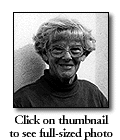Louise S. Dyer
San Diego Community College District Board of Trustees,
1981 - 90
San Diego Community College District Adult Education Teacher,
1974 - 81
San Diego Unified School District Board of Education,
1965 - 73
Role of the school board.
Excerpt from an interview with:
LOUISE S. DYER by LINDA L. WEST
November 9, 1992
San Diego, California
DYER:
It's to set policy. The only person we really hire is the superintendent or the
chancellor in our community college district — we call it the chancellor. We
[the board] set[s] the broad general policies, and then you try and influence
legislation of the state or be involved with it; that will improve the
education and work for getting the proper financial support from the state, and
then being kind of a good will ambassador in the community to explain education
to the people. But it isn't to get in and administer the district. That should
be left up to the superintendent or chancellor. And if you [the board] don't
[doesn't] like the job that's being done, then that's the person you get rid
of, you know. [Chuckling]
So those years on the school board involved some hard times, like it did all over the country when the civil rights movement was beginning. And we had our share, I guess, of problems, not real serious here, not like some cities. Then, when I was teaching, it seemed like things went along pretty smoothly, and here we could, if you needed more money, you could decide to raise the tax … you know, property tax rates. And we had a good district and financially we were doing fine.
And then when Prop. 13 came in, it meant again very definite changes. There suddenly wasn't the money, you didn't have control over it, and yet the public and the staff and faculty felt that you [the board] should be able to get all this money and do all these things they wanted, and there simply wasn't money. And you also then had to cut down on maintenance and building and things because the money had to go into just education, which is, of course, where it should go. But you also have to maintain equipment and you have to buy new equipment. Some of the programs are expensive that they take, particularly so many of the skills center type programs, and you have to keep up with changing machinery and everything. So there have been changes in that way.
I think the other change is the realization by the boards that they have to be more involved with the business community in involving them and working with them to either have classes on their sites or have their employees come in. One thing that we did that ended up being extremely controversial was establishing a foundation, and our former chancellor Garland Peed, who was chancellor when I was elected, and before that for several years, when I was elected in '81, that is. His area, he had been business manager here briefly first, and his area — it was really an expertise — was in the management and financial area. So we set up a foundation patterned after those in the major colleges and universities across the country.
Our first efforts were in teaching classes for the navy at the Naval Training Center here, and gradually during the years I was on the board we were teaching in all the major recruit centers for the navy, and many for the Marine Corps and the army all over the country, and it was all done under the foundation.
Also, when we could no longer teach certain kinds of classes, one of the main areas was in foreign languages, and [other] continuing ed. We had to discontinue them [foreign languages in adult education]. Then the next year we set up classes under the foundation to teach foreign language. That was different, but here we'd been without any language classes and we needed it. The salary schedule and the various things were a little bit different and it caused controversy, of course, out there, but we could no longer [according to state law] teach the kind of classes that we had been teaching, and we felt it was better to have one kind than nothing at all. So things changed because of laws and it meant that board members increasingly were being called upon to answer to these various things, being dragged into, you know, controversy, where they really were setting policy, I feel, appropriately.

